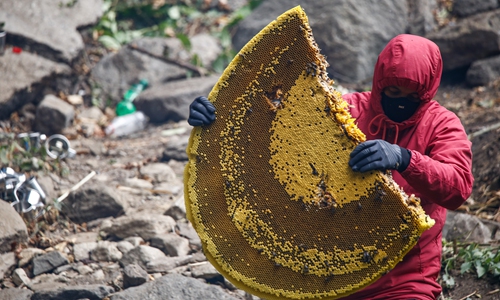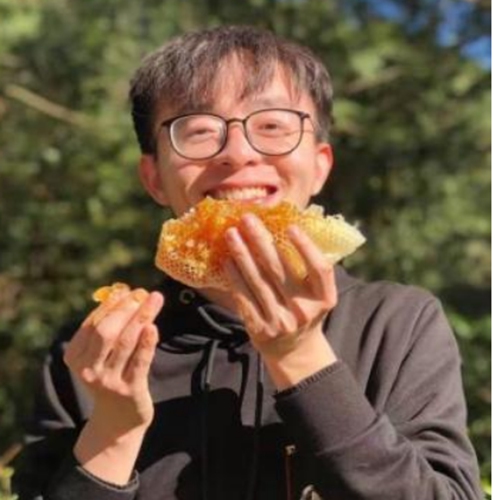HOME >> CHINA
Cliff honey hunting enthusiast helps Yunnan minority escape poverty
Source:Global Times Published: 2019/12/26 20:19:54

A honey hunter in Nepal handles a big piece of a hive in April. Photo: cnsphoto
To gather wild honey from cliff in Southwest China's Yunnan Province, honey hunters risk their life every day, facing swarms of bees and being stung repeatedly while standing on a rope ladder.
Recording the work of these honey hunters has become a daily routine for Ru Qiukai, who is originally from Taizhou, East China's Zhejiang Province. The 26-year-old young man left his well-paid job at a bank in July. He now pursues his dream in a gorge of the mountainous Dehong prefecture in Yunnan. Ru calls himself a spokesperson for cliff honey hunters.
Cliff honey gathering is a long standing cultural tradition and the main way of making a living for the people of Lisu ethnic minority, who live in the mountainous southwest area of Yunnan along the border with Myanmar.
Ru uses new media and online platforms to promote the cliff honey hunters' stories, including their moments of danger and hardship. Through his efforts, cliff honey hunting on the China-Myanmar border areas has garnered much attention. The sweetest part of it is that this particular way of extraction of a natural treasure is lifting people out of poverty.

Inset: Ru Qiukai Photo: screenshot of chinanew.com report
Faded tradition
In 2018, Ru met a group of Lisu honey hunters during a research trip to the countryside in Dehong of Yunnan Province. He learned about their stories of using extraordinary courage and skill, and risking their lives, to climb a 100-meter cliff to collect precious honey.
Born in a peasant family, Ru witnessed the hardships of his father on the farm work. He says he always had a dream in his heart - to reward hard working farmers. As a graduate from Zhejiang University, one of China's top universities, Ru hopes to use his knowledge to boost Dehong's rural economic and ecology.
He quit his job at a bank in Taizhou and joined two internet companies to help farmers develop agricultural projects, teach them how to use the internet, develop industries and polish the image of their brands, Ru told the chinanews.com.
Giant bees and dark giant bees are two types of the apis dorsata, a species of the world's largest honey bees. The bees can measure up to almost 3 centimeters in size and are mainly found in the southern foothills of the Himalayas.
The Lisu people see the honey from these bees as a gift from nature. Cliff honey is also one of the most common medicines used by families in the region. Collecting it is an arduous and challenging process that has been a tradition for thousands of years. Hunters wear protective gear and use smoke to scatter the huge bees from their hives to reduce the risk of confrontation.
Severe ecological crises pose a threat to the honey gatherers' way of life. "Some honey hunters said they are finding fewer hives than that in the past, because bee populations are impacted by heavy pesticide used among local farmers and by global warming," Kevin Frayer, a photographer with Getty who went honey hunting with a group of ethnic Lisu people in Yunnan, told the US-based magazine the Atlantic.
Protecting and retaining the cliff honey gathering skills of the Lisu people has also become a driving force for Ru. In July, Ru started a business with farmers and honey hunters in Dehong.
Digital promotion
Ru took short videos on how to collect honey from cliffs and shared his work with people online to promote this culture and technique.
"From them, I see the down-to-earth spirits of the Chinese farmers, and I see how the ethnical minority groups' lives changing upon their dedication," Ru was quoted as saying by chinanews.com.
"I found the outside world is very curious about cliff honey hunting. For example, Kevin Frayer, a Canadian photographer, came to take a series of picture stories to record their lives. A man from Pakistan flew thousands of miles to Yunnan to buy a few hundred pounds of honey. More people are searching for 'Chinese cliff honey' on Google," said Ru.
The improved international brand image of cliff honey also helps Dehong locals improve their income. For a long time, the economic returns for cliff climbing honey hunters was low, leaving only older honey hunters to climb the cliffs. Younger generations have been lured away by more lucrative jobs.
Although the price of cliff honey in small villages has risen by 50 percent this year, it still lags far behind that in Nepal, Ru told chinanews.com, saying that he wishes his efforts could bring financial rewards and more dignity to cliff honey collectors.
Ru said his future plan will focus on further building the brand of cliff honey to shape the image of this border village and create a honey mining-themed tour.
He said he hopes to keep maintaining the skill of honey gathering while lifting farmers out of poverty through maximizing the economic value of their tradition.
"In addition, cliff honey is a very unique agricultural product, and with the story of honey harvesting, there is a lot of potential," said Ru.
Global Times
Newspaper headline: Sweet Rewards
RELATED ARTICLES:
Posted in: PROFILE